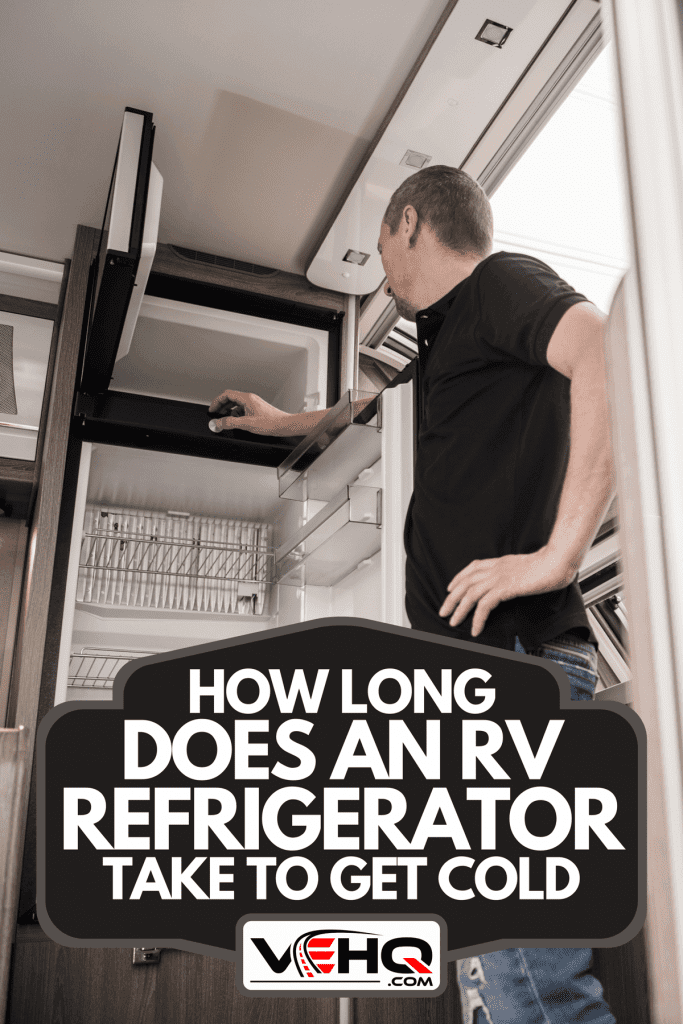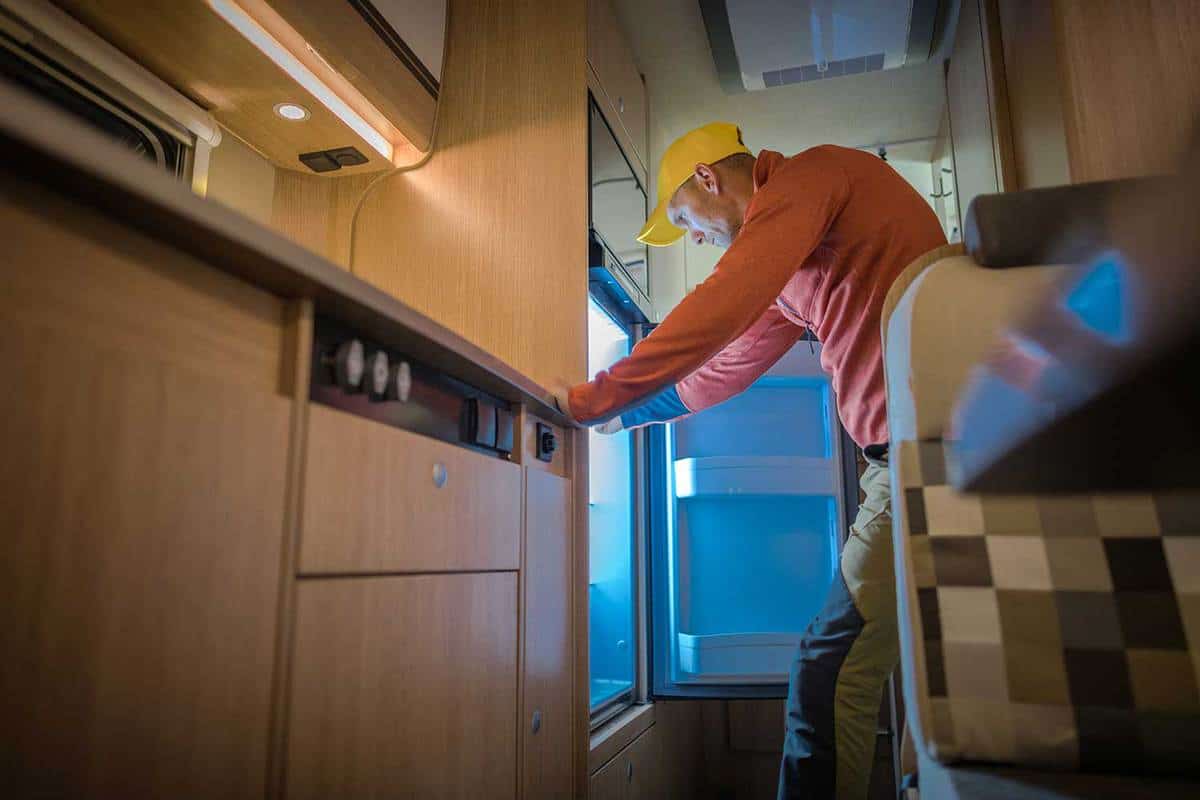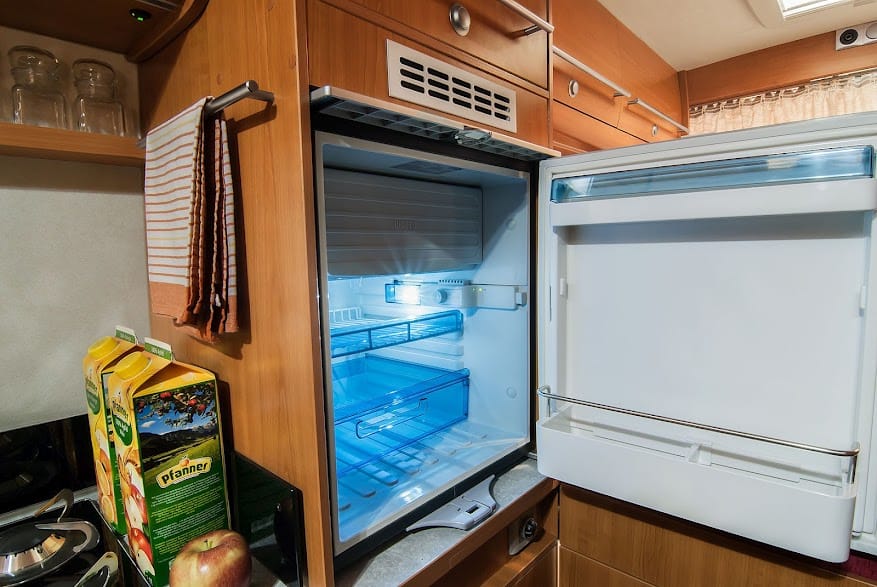Having a refrigerator inside your RV is a great idea, especially when you plan on going on road trips or camping with your family and friends. It is always convenient to stock on meat and beverages on long trips. But how long does an RV refrigerator take to get cold and be ready for the trip anyway? We've searched for the answer for you.
The time for your RV refrigerator to get cold would vary depending on the type of fridge you have. Some RV fridge units usually take 5.5 to 6 hours to reach the recommended temperature. While some RV fridges would take three to 24 hours to cool down.
Now that you already have an idea of how long it takes for your RV refrigerators to get cold, continue reading as we elaborate more on the topic. Along the way, we'll tackle the different types of RV refrigerators and answer questions people usually ask in relation to the topic.

RV Refrigerator Temperature & Cool Down Time
As published by the US Food & Drug Administration(FDA), the recommended temperature for a refrigerator should be 40°F or lower. This means that before you travel or go on a long road trip, make sure your refrigerator hits the recommended temperature first before storing in food or any perishable products.
An RV fridge would cool down depending on its size and type. Older RV fridges also take longer to get cold. A newer version of an RV ">absorption refrigerator takes 5.5 to 6 hours to get cold. While a residential type of fridge usually takes three to 24 hours to cool down.

Four different types of RV refrigerators
There are different ">types of RV refrigerators that are available in stores. So we've listed each one and provided their pros and cons to know which one best suits your RV style and capacity or if your current fridge is the right one for your RV setting.
1. DC compressor
https://www.pinterest.ph/pin/777152479442075911/
This type of RV fridge is designed to run on 12-volt AC/DC power so you can plug it directly into your battery. This refrigerator is similar to the residential one since they both use a compressor to function. As to its size, this is typically smaller compared to a residential fridge but similarly the same size as a propane/electric unit.
Pros
- This fridge is more efficient in terms of power usage.
- This works very well in an off-grid boondocking environment if you have an additional solar setup.
- Its cooling system works even when it is placed in an uneven location.
- This type can cool the entire fridge evenly and consistently, and it will not be susceptible to any weather conditions.
Cons
- If you're in a hot weather area, sometimes, this type of fridge doesn't cool well.
- Its size has to be small to make it power efficient.
- This can drain your RV battery if you don't have an enhanced battery system like a solar panel or generator.
2. Thermoelectric (solid-state)
https://www.pinterest.ph/pin/177751516535126822/
This type of refrigerator is not that common, but oftentimes, this is used as a secondary refrigerator in RVs. A solid-state thermoelectric refrigerator uses semiconductors and electricity to create a heating and cooling effect. So when you apply power to it, it gets cold on one side and hot on the other side.
Pros
- Solid-state means there are no parts moving. Hence, you could mount it in any orientation or position.
- This refrigerator operates silently.
- Given its size, this refrigerator is quite handy.
Cons
- It has limited cooling capacity compared to other types of RV refrigerators.
- This type of refrigerator is very susceptible to outside weather conditions.
3. Residential
https://www.pinterest.ph/pin/38210296828433059/
As the name itself suggests, a residential refrigerator is what you usually use or see inside your house. It solely uses electricity to function. This became popular in the RV community because of its spacious interior.
Pros
- Residential refrigerators have a larger capacity compared to other RV fridge types. So if you want to go on a long road trip and want that full fridge space, this one's for you.
- They have a lot of different sizes, colors, features, and styles to choose from that fit your RV's design.
- They evenly stay cold inside and aren't susceptible to the outside weather.
Cons
- This type of refrigerator isn't efficient when you want to spend most of your time off-grid. This might quickly drain your batteries if you don't have a solar array or a generator system set up.
- A residential refrigerator emits the heat it created into the entire RV. So if you're in a hot weather condition, your RV's A/C system will have to work harder to cool down the RV.
- Since they're bigger and heavier, you'll have a hard time installing them inside your RV.
4. Propane/electric (ammonia absorption refrigerator)
https://www.pinterest.ph/pin/474496510754586983/
This type of RV refrigerator is quite popular in the RV community because they're best for boondocking. It uses electricity to start, and it can operate on electricity when there's no propane available. Absorption refrigerators have a two-way and a three-way fridge system.
A two-way fridge can function using an LP gas or through an AC power. On the other hand, a three-way fridge can work by using an LP gas, AC power, and DC power.
Pros
- You can initially set it on electric mode before starting your trip. And once you unplug it and start driving, it just switches to gas or propane automatically while continuously operating.
- This refrigerator is best for boondocking, especially if you spend a lot of time off-grid.
- This kind of refrigerator rejects all of the heat, making sure that only the cold air remains inside the fridge.
- As its name suggests, it is quite efficient for gas or propane use.
Cons
- Gas/electric RV refrigerators aren't so efficient when it comes to electric use.
- If you're in a ">hot weather area, this type of fridge sometimes doesn't cool well.
- If you're in a really cold weather area, your fridge might turn really frosted.
- This type of fridge needs maintenance because it uses propane. You need to clean the burner and the area around it occasionally to keep everything safe.
- To prevent damage, this type of fridge needs to be placed or sit in a safe and properly leveled position.
- This should not be overstuffed with anything that's warm and needs to be kept at a cold temperature.
See three of these refrigerator unit types installed in an RV to get an idea of how each might work for you:
How do I make my RV fridge cool faster?
One thing that can make your RV fridge cool faster is to place ice cubes or gel freezer packs in it. This way, the coldness of the ice and gel freezer packs will spread throughout the entire fridge and will hasten its cooling process.
Another way to make your fridge cool faster is to use a ">fridge fan. The air coming from the fridge fan will help in the even distribution of cold air into the entire refrigerator, hence accelerating the cooling process.
Check this RV refrigerator fan on Amazon.
Why is my RV refrigerator not getting cold?
A refrigerant is a compound that is responsible for cooling. Usually, when you're going on trips and experience bumpy roads, the refrigerants tend to swing around and get clogged up into the system. So when this happens, the cooling system gets compromised, and the fridge will not get cold.
What cools an RV refrigerator?
An RV refrigerator gets cold by a chemical reaction between water, ammonia, and hydrogen and also by absorption. Other types of RV refrigerators cool down because of their solid-state thermoelectric technology or with the use of compressors.
Get a firsthand review of refrigerator types from seasoned RVers, with an in-depth look at these cooling methods:
How long will an RV fridge last on propane?
An eight cubic feet refrigerator burns at a rate of 1,500 BTUs per hour. If your fridge is smaller, it usually consumes less.
For a ">20 lbs propane tank, only 16 lbs are pure propane. A pound of propane is equal to 21, 548 BTUs (British Thermal Unit). If you multiply it by 16, the product would be 344,768 BTUs. So if your refrigerator runs at a rate of 1,500 BTU per hour, it would take more or less nine and a half days for your RV fridge to last on propane.
Does RV refrigerator cool better on gas or electric?
An RV refrigerator cools better when using electricity because the cold air inside stays for a longer time. The cold is evenly distributed inside the fridge, making it ideal for keeping your food fresh. And because it is electrically powered, you won't have to worry about its leveling orientation to work properly.

In Summary
There are four types of RV refrigerators, namely, a compressor, residential, gas/electric, and thermoelectric. Since each one of them differs in size, feature, and the kind of power system they use, thus their time to cool down also varies.
Smaller and newer RV fridge usually just takes 5.5 to 6 hours to cool down. While those with bigger sizes and older models usually take 12 to 24 hours to reach 40°F or lower temperature.
Before going, you may want to check these posts to learn more about RV refrigerators:
RV Fridge Vs. Residential? (What You Need To Know About RV Refrigerators)
How To Pack An RV Refrigerator The Right Way (11 Practical Tips!)

